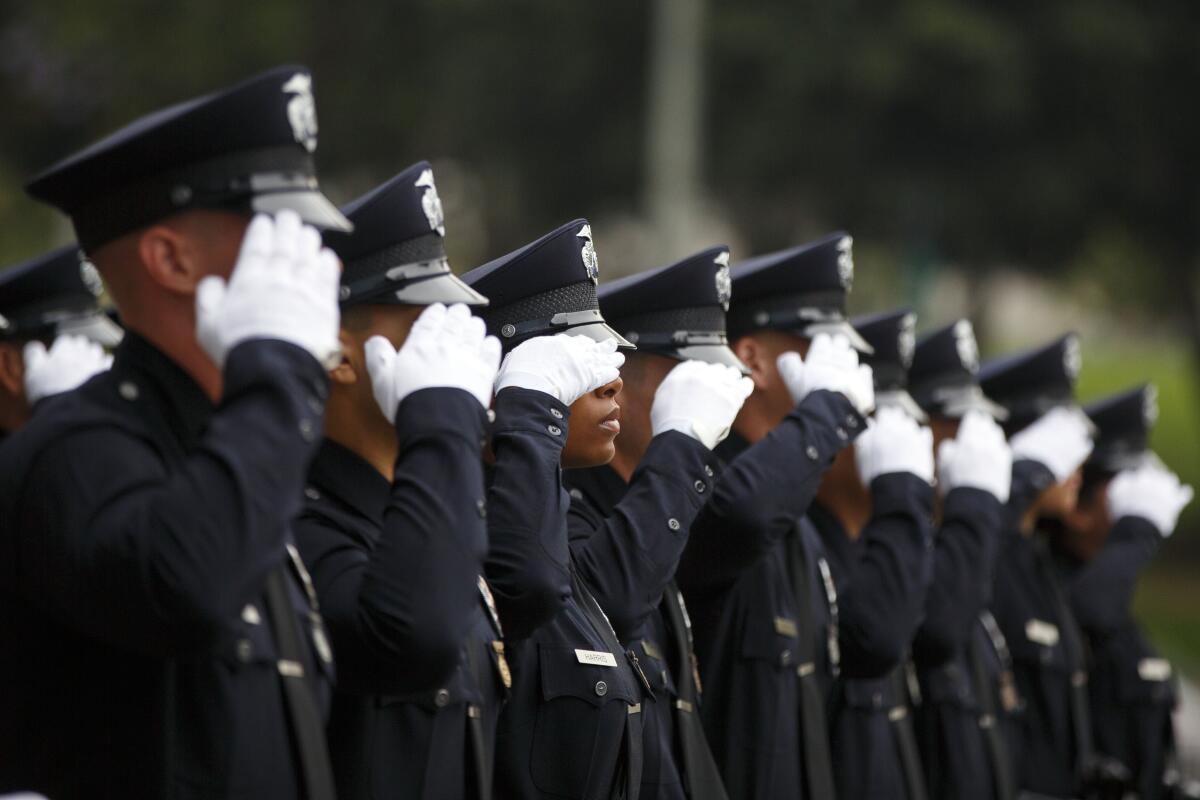LAPD police union sues Chief Moore, wants images of undercover officers taken offline

- Share via
The union representing Los Angeles police rank and file sued Chief Michel Moore on Tuesday to force the department to stop making officers’ photos public and to claw back images of undercover officers given out under the state’s public records law.
The lawsuit follows more than a week of controversy, after the LAPD released the names, photographs and other identifying information of more than 9,300 officers to a watchdog group that posted them on its website.
The LAPD released the images and information as part of a public records request to a journalist with the nonprofit newsroom Knock LA. The Stop LAPD Spying Coalition, an activist group, then turned the photos into a public, searchable database called “Watch the Watchers,” which includes each officer’s name, ethnicity, rank, date of hire, division/bureau, badge number and photo.
Robert Rico, legal counsel for the Los Angeles Police Protective League, said Tuesday that the union also will ask the judge to temporarily take down the Watch the Watchers website until the city determines which of those officers’ images should be excluded for security reasons.
After the site’s launch this month, department leaders revealed that they had inadvertently released photos of officers working undercover as part of a disclosure required under the California Public Records Act. LAPD sources, not authorized to discuss the matter, have said the undercover officers whose identities were compromised number in the dozens, if not hundreds.
Rico said the lawsuit would give those officers who believe their positions put them in potential danger “the ability to have redress in court and address the court to have their photographs and names clawed back. That’s a legal term.”
He said the union has a broader definition of “undercover” than the public: “any officer who’s working in a true undercover or other sensitive assignment. For example, we have officers that surveil. They’re not undercover, in other words, they don’t have disguises, they didn’t have beards grown out. But they do work on details surveilling home invasion robbers, people that are involved in potential domestic terrorism.”
The league’s proposed exclusions would extend to officers who had previously worked undercover, he said.
Rico acknowledged that the photos had already spread far beyond Watch the Watchers into other corners of the internet. But, he said, the union wants the court to “fashion a remedy” to scrub those photos of undercover officers as they surface online.
Hamid Khan, a coordinator with the Stop the LAPD Spying Coalition, called the union’s filing a clear “assault on people’s rights to access” information necessary to hold the LAPD accountable. The coalition wants to abolish traditional law enforcement but in the interim has pushed for what it calls radical transparency.
In the lawsuit filed Tuesday, the police union alleges negligence by the LAPD and said it was forced to sue the city and Moore after they refused to take legal action to prevent further disclosure of undercover officers’ photos
The suit asks a judge to require the city “to undertake any and all necessary legal and/or equitable action to prevent further disclosure of undercover officer photographs, including but not limited to securing the unlawfully disclosed photographs from the CPRA recipient, and ensuring such photographs are never publicly disclosed in the future.”
The union is asking for a preliminary injunction and immediate temporary restraining order to prevent what it described as further harm pending a final judgment in the case.
On Friday, Moore said he has taken steps to address the safety concerns of those whose photos were released. “We erred in the sense that there’s photographs that are in there that should not have been in there,” Moore said in an interview. “Now, but that ship has sailed.”
Moore declined to comment Tuesday, saying he had not seen the union lawsuit.
The union has already filed a formal complaint against Moore and Lizabeth Rhodes, director of the LAPD’s Office of Constitutional Policing. Moore has asked the inspector general to take over the probe into the release of the data to avoid a conflict of interest.
Mayor Karen Bass in a tweet over the weekend called the release “an unacceptable breach that put the lives of our officers and their families at risk” and said she expects a “full accounting” of how it happened.
But free-speech experts say the union’s argument for obtaining a court order is part of a long history of efforts to block the press from publishing sensitive material through “prior restraint.”
Such protections, established in the landmark 1931 U.S. Supreme Court decision Near vs. Minnesota, extend even to materials that were accidentally released, according to David Loy, legal director for the 1st Amendment Coalition.
Legal arguments against the publication of lawfully obtained documents are “virtually always unconstitutional,” Loy said.“Obviously names and identities of people drawing a public paycheck is an issue of public concerns. Whether or not the LAPD messed up” is a different matter.
“The 1st Amendment does not defend itself, and there’s never any shortage of people trying to silence others from speaking out, whether it’s law enforcement or somebody else,” Loy said. “Free speech is the oxygen of civil society. We cannot allow courts to silence protected speech, because if we allow this sort of prior restraint, where is it going to stop?”
Multiple LAPD sources not authorized to discuss the photo controversy said Rhodes, who oversaw the photo disclosure, should have ensured that any officer working in an undercover capacity was excluded.
More to Read
Sign up for Essential California
The most important California stories and recommendations in your inbox every morning.
You may occasionally receive promotional content from the Los Angeles Times.















